Terry Teachout's Blog, page 24
February 4, 2014
See me, hear me (cont'd)
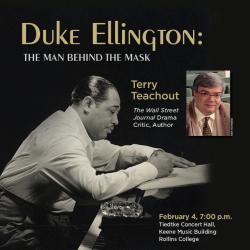 If you live in the vicinity of Winter Park, Florida, I'm lecturing about Duke Ellington tonight at Rollins College. My talk, which is called "Duke Ellington: The Man Behind the Mask," is based on my newly published
Ellington biography
. A jazz combo led by
Chuck Archard
is accompanying me, and I'll also be showing Ellington-related film clips and (as usual) taking questions from the audience.
If you live in the vicinity of Winter Park, Florida, I'm lecturing about Duke Ellington tonight at Rollins College. My talk, which is called "Duke Ellington: The Man Behind the Mask," is based on my newly published
Ellington biography
. A jazz combo led by
Chuck Archard
is accompanying me, and I'll also be showing Ellington-related film clips and (as usual) taking questions from the audience.The event takes place at Tiedtke Concert Hall and starts at seven p.m. sharp. No tickets or reservations are required. For more information, go here .
Almanac: Ronald Knox on false tolerance
Ronald Knox, Barchester Pilgrimage
February 3, 2014
On your mark
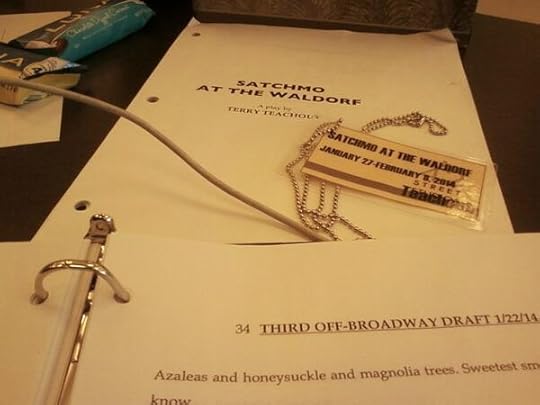 I arose at four a.m. last Tuesday and flew from Florida to New York to take part in a "straight six" rehearsal (six hours, no lunch break) for
Satchmo at the Waldorf
. It was forty degrees colder in Manhattan than in Orlando, and the cabby who picked me up at the airport was puzzled by the fact that I'd chosen to come north.
I arose at four a.m. last Tuesday and flew from Florida to New York to take part in a "straight six" rehearsal (six hours, no lunch break) for
Satchmo at the Waldorf
. It was forty degrees colder in Manhattan than in Orlando, and the cabby who picked me up at the airport was puzzled by the fact that I'd chosen to come north."You in town on business?" he asked.
"I'm here to rehearse a play," I replied.
"Huh. So, what are you? The director?"
"Writer."
I said it casually--or tried to--but it still felt to me as though trumpets were playing a fanfare somewhere in the distance.
 We're working at the New 42nd Street Studios, next door to the American Airlines Theatre, where I saw the Roundabout Theatre Company's revival of Machinal a couple of weeks ago. "What production, sir?" the man at the front desk asked, then handed me a laminated Satchmo at the Waldorf studio pass. I took the elevator to the seventh floor, noticing as I got off that Aladdin, the new Disney musical, is being rehearsed next door in the Jerome Robbins Studio. A plaque on the door to our space, the
Mike Ockrent
Studio, bore the following motto: REHEARSAL IS THE BEST PART.
We're working at the New 42nd Street Studios, next door to the American Airlines Theatre, where I saw the Roundabout Theatre Company's revival of Machinal a couple of weeks ago. "What production, sir?" the man at the front desk asked, then handed me a laminated Satchmo at the Waldorf studio pass. I took the elevator to the seventh floor, noticing as I got off that Aladdin, the new Disney musical, is being rehearsed next door in the Jerome Robbins Studio. A plaque on the door to our space, the
Mike Ockrent
Studio, bore the following motto: REHEARSAL IS THE BEST PART.I guess it's for keeps this time, I said to myself. Then I took a deep breath, walked in, and said hello to everybody. A few minutes later we were off and running, and a few more minutes after that I was swept up once again in the all-consuming process of staging a play.
What happens in a rehearsal hall stays in a rehearsal hall, but I can tell you that everything is going smoothly, just as it has ever since Gordon Edelstein, John Douglas Thompson, and I started working on Satchmo in 2012. I've added four short scenes to the script since the play was last performed in Philadelphia, three musical sequences and a new speech. This was the first time that I'd seen them acted, and they all looked and sounded convincing. In addition, I rewrote on the spot another bit that had long given us trouble, feeling as I did so just like...well, like a professional playwright.
 After rehearsal I grabbed a bite to eat, then went to the Samuel J. Friedman Theatre to see Outside Mullingar, John Patrick Shanley's new play. The next day I flew back to Florida and Mrs. T. We dined on leftovers and watched Tootsie, which opens with a montage of scenes from unsuccessful auditions at which Dustin Hoffman's character fails to get the part. Not surprisingly, this sequence is much more meaningful to me today than when I saw Tootsie in the theater thirty-two years ago. (Incidentally, I stole one of Joe Glaser's lines in Satchmo at the Waldorf from Tootsie. So far, nobody's noticed.)
After rehearsal I grabbed a bite to eat, then went to the Samuel J. Friedman Theatre to see Outside Mullingar, John Patrick Shanley's new play. The next day I flew back to Florida and Mrs. T. We dined on leftovers and watched Tootsie, which opens with a montage of scenes from unsuccessful auditions at which Dustin Hoffman's character fails to get the part. Not surprisingly, this sequence is much more meaningful to me today than when I saw Tootsie in the theater thirty-two years ago. (Incidentally, I stole one of Joe Glaser's lines in Satchmo at the Waldorf from Tootsie. So far, nobody's noticed.)I spent Tuesday evening with a new friend, a singer who hails from a very small town very far from New York. While my friend loves her new home, she confessed to me over dinner that she'd been feeling a bit blue of late, mainly because of the horrific difficulties facing any performer who tries to make her way in a place like this at a time like this. "I've been doing pretty well for myself," she said, "but the longer I live here, the more I feel like singing 'Is That All There Is?'" But then we ate our meal and strolled across the street to see our show, and the next day she sent me an e-mail that read as follows: "Thank you for such a delightful evening. You helped me remember how magical New York City can be."
I knew exactly what she meant, because I'd been thinking much the same thing all day long. Sometimes living here is like sticking your head in a pencil sharpener and turning the handle yourself, and there are plenty of days when I mutter Damn this place anyway! and start trying to figure out how to get the hell out of town for good. Yet there are also the times when a security guard says "What production, sir?" and hands me a badge with the name of my first play printed on it, and I find myself whistling a different tune in a major key.
Love it or hate it--or, just as likely, both--there's no place in the world like the theater district of New York. Especially when you've got a show coming in.
* * *
Gene Kelly, Jules Munshin, and Frank Sinatra sing "New York, New York," by Leonard Bernstein, Betty Comden, and Adolph Green, in the 1949 film version of On the Town:
Just because: Julian Bream plays Villa-Lobos
(This is the latest in a series of arts-related videos that appear in this space each Monday and Wednesday.)
Almanac: Alec Guinness on fools
Alec Guinness, A Commonplace Book
February 2, 2014
Philip Seymour Hoffman, R.I.P.
Actors are peculiarly sensitive creatures. Some of them are so desperate for approval and unsure of their own identities that they will go to great and dangerous lengths merely to get through the day, much less a performance. I know nothing about Hoffman's private life, but anyone who dies as he did must have felt the pain of the damned. That he still managed to leave behind so much eloquent evidence of his extraordinary talent now looks in retrospect like something of a miracle.
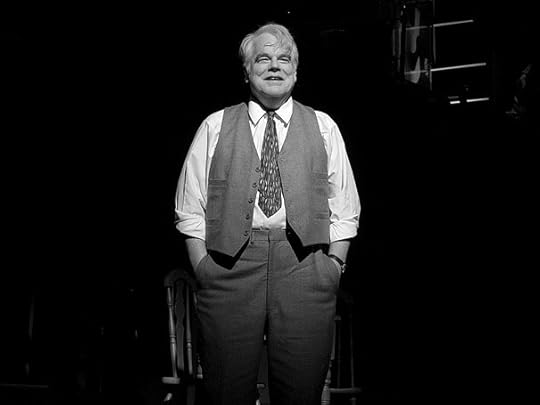 Hoffman was as good on stage as on screen, and I had the honor to review his performance as Willy Loman in Mike Nichols' 2012 revival of Death of a Salesman. This is what I wrote about it:
Hoffman was as good on stage as on screen, and I had the honor to review his performance as Willy Loman in Mike Nichols' 2012 revival of Death of a Salesman. This is what I wrote about it:Philip Seymour Hoffman, the star of Mike Nichols' revival of Arthur Miller's "Death of a Salesman," is following in the well-remembered footsteps of Lee J. Cobb, George C. Scott, Dustin Hoffman and Brian Dennehy, and it's a tribute to his talent that you won't feel inclined to compare him to any of his predecessors. When he first comes trudging onto the stage, carrying his weatherbeaten sample cases as though each one contains half the weight of the world, you feel at once that you're seeing not a performance but a person, stooped and stunned by the burden of failure. No sooner does he sigh "Oh, boy, oh, boy" than you forget all about the actor and follow Willy down the stony road to the open grave that awaits him at play's end.
I'm glad I was there that night. I hope he was proud of what he did.
* * *
A scene from Capote, written by Dan Futterman, directed by Bennett Miller, and starring Philip Seymour Hoffman, Catherine Keener, and Chris Cooper:
January 31, 2014
So kiss her already!
* * *
Nine years ago, John Patrick Shanley, a prolific playwright of a certain age who had yet to crack Broadway and was mainly known for having written the screenplay for "Moonstruck," hit the Great Stage Jackpot at long last with "Doubt," a savagely taut morality play about a charismatic priest who may or may not be a child molester. Mr. Shanley's timing couldn't have been better: "Doubt" transferred to Broadway, won the Pulitzer Prize, was turned into a Hollywood film and brought him to the attention of the public at large. Nothing that he's written since then has been nearly as successful, but "Defiance" (2006) and "Storefront Church" (2012), the second and third panels of a trilogy called "Church and State" that started with "Doubt," were very nearly as good, and it's a mystery to me why they failed to go over with audiences.
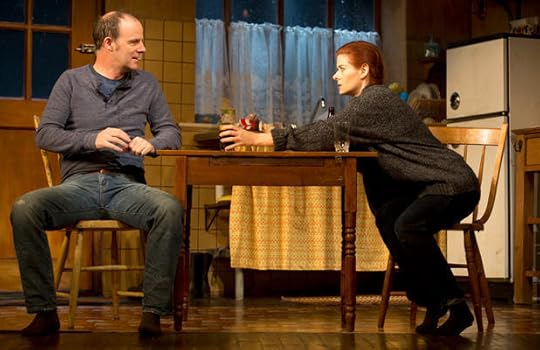 Now Mr. Shanley is back on Broadway with "Outside Mullingar," a romcom set in rural Ireland in which, for the first time in his playwriting life, he draws on his Irish family background. In doing so, he's playing in the big leagues: Brian Friel works the same turf, and Martin McDonagh and Conor McPherson, born two generations after Mr. Friel, are coming up fast behind him. What all three men share is an iron determination to steer clear of the sickeningly winsome stereotypes that have long blighted stage and screen portrayals of the Emerald Isle.
Now Mr. Shanley is back on Broadway with "Outside Mullingar," a romcom set in rural Ireland in which, for the first time in his playwriting life, he draws on his Irish family background. In doing so, he's playing in the big leagues: Brian Friel works the same turf, and Martin McDonagh and Conor McPherson, born two generations after Mr. Friel, are coming up fast behind him. What all three men share is an iron determination to steer clear of the sickeningly winsome stereotypes that have long blighted stage and screen portrayals of the Emerald Isle.As everyone who's seen "Moonstruck" will recall, Mr. Shanley, unlike his colleagues, has a weakness for ethnic whimsy, one that he ruthlessly suppressed in "Doubt" and "Defiance" (a touch of it crept into "Storefront Church"). This time around, by contrast, he's returned to the vein that he tapped in "Moonstruck," but he never stoops to the usual faith-and-begorra clichés in doing so, nor is "Outside Mullingar" a straight replay of his earlier tale of romantic derring-do. The difference lies in the choice of ethnicity. Here as in "Moonstruck," Mr. Shanley is telling a tale of inhibition overcome by love, but he's translated it (so to speak) from Italian to Gaelic, and the results are both charming and dramatically persuasive....
* * *
Read the whole thing here .
You broke it, you bought it
* * *
Two weeks ago, I was getting ready to go to Sarasota to see a revival by Florida's Asolo Repertory Theatre of Brian Friel's "Philadelphia, Here I Come!" Then I got an e-mail from the company's marketing director telling me that the performance had been canceled. No explanation was proffered, but I assumed that one of the stars was sick, and went elsewhere to see another show.
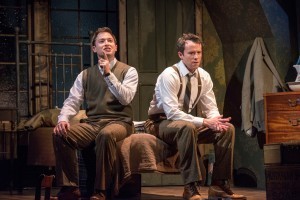 A few days later I found out that I'd been dead wrong. Jay Handelman, the Sarasota Herald-Tribune's theater critic, reported that Mr. Friel had abruptly withdrawn his permission for Asolo Rep to perform the play when he learned that Frank Galati, the director, had "cut three characters and eliminated two intermissions and some dialogue while adding a few Irish songs and a little dancing." "Philadelphia, Here I Come!" is now being restaged as written, and will reopen next week.
A few days later I found out that I'd been dead wrong. Jay Handelman, the Sarasota Herald-Tribune's theater critic, reported that Mr. Friel had abruptly withdrawn his permission for Asolo Rep to perform the play when he learned that Frank Galati, the director, had "cut three characters and eliminated two intermissions and some dialogue while adding a few Irish songs and a little dancing." "Philadelphia, Here I Come!" is now being restaged as written, and will reopen next week.I was staggered when I heard what Asolo Rep had done--not because they did it, but because they didn't clear it first with Mr. Friel. He is, after all, one of the world's greatest living playwrights, and "Philadelphia, Here I Come!" was the play that made him famous. When it was last performed in New York by the Irish Repertory Theatre in 2005, I judged it to be one of the best plays of the postwar era. I still feel that way. Is it unimprovably good? I think so, but that's not the point. "Philadelphia, Here I Come!" was written in 1964 and remains under copyright. It cannot be performed, much less altered, without the author's permission. End of story.
It was a very different story when Diane Paulus, Suzan-Lori Parks and Diedre L. Murray rewrote "Porgy and Bess" in 2011 for a revival that opened at Cambridge's American Repertory Theatre, then transferred successfully to Broadway. Their alterations, whose purpose was to modernize George Gershwin's 1935 masterpiece and render it politically correct, were done at the behest and with the permission of the estates of George and Ira Gershwin. They were tasteless, but legal.
As these two contrasting anecdotes suggest, playwrights (and their estates) take sharply differing views of such matters....
* * *
Read the whole thing here .
Almanac: John Whiting on unpopular theater
John Whiting, At Ease in a Bright Red Tie: Writings on Theatre (courtesy of George Hunka)
January 30, 2014
TT: So you want to see a show?
Here's my list of recommended Broadway, off-Broadway, and out-of-town shows, updated weekly. In all cases, I gave these shows favorable reviews (if sometimes qualifiedly so) in The Wall Street Journal when they opened. For more information, click on the title.
BROADWAY:
• A Gentleman's Guide to Love & Murder (musical, PG-13, reviewed here)
• Matilda (musical, G, all performances sold out last week, reviewed here)
• No Man's Land/Waiting for Godot (drama, PG-13, playing in rotating repertory, closes Mar. 30, reviewed here)
• Once (musical, G/PG-13, reviewed here)
OFF BROADWAY:
• Avenue Q (musical, R, adult subject matter and one show-stopping scene of puppet-on-puppet sex, reviewed here)
• The Fantasticks (musical, G, suitable for children capable of enjoying a love story, reviewed here)
• Hamlet/Saint Joan (drama, G/PG-13, remounting of off-Broadway production, playing in rotating repertory, closes Mar. 9, original production reviewed here)
IN GLENCOE, ILL.:
• Port Authority (drama, PG-13, closes Mar. 2, reviewed here)
CLOSING SOON ON BROADWAY:
• Twelfth Night (Shakespeare, G/PG-13, closes Feb. 16, all performances sold out last week, reviewed here)
CLOSING NEXT WEEK OFF BROADWAY:
• King Lear (Shakespeare, PG-13, closes Feb. 9, reviewed here)
• The Commons of Pensacola (drama, PG-13, closes Feb. 9, reviewed here)
CLOSING NEXT WEEK IN FORT MYERS, FLA.:
• Arsenic and Old Lace (drama, G, closes Feb. 4, reviewed here)
Terry Teachout's Blog
- Terry Teachout's profile
- 45 followers



